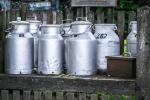H2020 GAIN4CROPS Project: Reconfiguring photorespiration using natural and synthetic pathways to sustainably increase crop yields
- Type Project
- Status Signed
- Execution 2020 -2026
- Assigned Budget 8.014.100,00 €
- Scope Europeo
- Main source of financing Horizon 2020
- Project website GAIN4CROPS
Improving crop productivity is an increasingly important goal to meet the food and fuel needs of a growing global population facing the uncertainty of climate change.
Photosynthesis is a major determinant of crop yield. During this process, plants fix (assimilate) atmospheric carbon dioxide (CO2) to generate organic compounds and, therefore, biomass. Photorespiration is a process in higher plants during which they fix oxygen (O2) instead of CO2 when CO2 is low. They consume O2 and release CO2 without producing ATP or sugar, thereby reducing the production of fixed CO2 and biomass.
The EU-funded GAIN4CROPS project is working to minimize the inefficiencies of photorespiration and thus boost crop productivity. To do so, the team is designing highly efficient synthetic metabolic pathways to dramatically increase carbon sequestration.
Photorespiration (recycling the oxygenation production of Rubisco, 2-phosphoglycolate (2PG), back into the Calvin cycle) is an inescapable process in modern plants, dissipating energy and releasing CO2. Photorespiration reduces CO2 assimilation efficiency, and thus biomass yield, by ~30% and represents a major target for improving agricultural productivity, as demonstrated in several recent studies. However, engineering of alternative photorespiration pathways to date is limited to pathways that release CO2, leaving room for considerable further improvements. Another opportunity to reduce the inefficiencies of photorespiration is to minimize it by engineering C4 metabolism, which serves as a carbon pump that increases CO2 concentrations near Rubisco.
GAIN4CROPS aims to increase plant productivity by using novel strategies to minimize the inefficiencies of photorespiration. GAIN4CROPS will follow a step-by-step approach, starting with the design of natural carbon pumps and culminating with the introduction of highly efficient synthetic metabolic pathways that can dramatically increase carbon fixation.
First, we will engineer a C3 culture to operate the natural C3-C4 carbon pump, increasing carbon fixation and requiring less complex anatomical modifications than C4 metabolism, using only genome editing and extensive crosses. This step serves as a conceptually novel and "natural" approach to engineering C4 metabolism.
Second, GAIN4CROPS will develop more efficient synthetic C3-C4 carbon pump variants that rely on efficient intercellular transport of aspartate or malate while conserving cellular resources.
Finally, building on C3-C4 metabolism, GAIN4CROPS will explore two innovative photorespiration bypass pathways that, instead of releasing CO2, fix inorganic carbon, thereby directly contributing to carbon fixation. GAIN4CROPS will serve as a research and innovation roadmap for achieving similarly superior photosynthetic performance in a wide range of C3 crops.
- HEINRICH-HEINE-UNIVERSITAET DUESSELDORF (UDUS)







